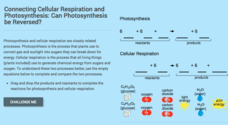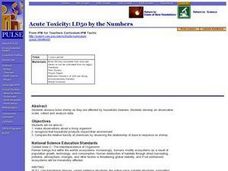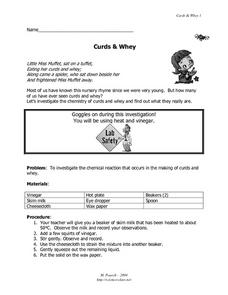Virginia Department of Education
The Ratio of Surface Area to Volume
Demonstrate the ratio of surface area to volume in your high school class by using phenolphthalein, gelatin, and an onion. Intrigue the class by leading a discussion on osmosis and diffusion, then making "scientific jello." Participants...
Curated OER
Lab Tests, Results, and Sulfuric Acid
You may want to change the title of this chemistry PowerPoint to "Identifying Compounds in the Laboratory." Individual slides explain tests that can be performed to confirm what element you have: carbon dioxide, carbonates, and metal...
Curated OER
Elements Make Compounds
This presentation starts with safety warnings for an experiment. Students will be introduced to the reaction that happens when magnesium is burned, the chemical background and the energy changes. Excellent examples and labeled reactions...
Chymist
Landfills and Recycling
Examine the nature of landfills through experimentation. Scholars build miniature landfills and monitor changes over a six-week period. Observations allow individuals to draw conclusions about the different types of trash and their...
Curated OER
Point- vs. Non-point Pollution
Students differentiate between point and non-point pollution and determine how the different types of pollution are harmful to aquatic ecosystems. They complete a series of tests on a sample of "polluted" water and a sample of "pure" water.
Curated OER
Energy Transformation Worksheet
Upper elementary or middle school scientists determine what types of energy are involved in six different pictures. Then they produce examples of three different energy transformations. This instructional activity has colorful graphics...
CK-12 Foundation
Cellular Respiration: Can Photosynthesis Be Reversed?
Cellular respiration and photosynthesis relate closely, but many don't realize how. Scholars drag and drop the reactants and products to the chemical reactions for both processes. Then they answer three multiple-choice questions.
Curated OER
pH Potential
Students experiment to determine the positive and negative impacts of human activities on environmental change. They examine how physical and biological processes such as decomposition affect soil characteristics while looking at the pH...
Curated OER
Acute Toxicity: LD50 by the Numbers
Students observe brine shrimp as they are affected by household cleaners, develop observation scale, collect and analyze data, and discuss how household products and pesticides negatively impact environment.
Curated OER
Outcomes Science 4: Earth & Beyond
In this earth and beyond science worksheet, students read through 11 pages of information on weather, global warming, climate change and other related topics. There are many website links on the pages that provide additional information...
Curated OER
Here Today, Gone Tomorrow
Students study the difference between chemical and physical weathering. They explore the effects of climate on the weathering process.
Curated OER
Temperature and Enzymes
Students compare the times it takes the milk in each of two cups to curdle. They are told that an enzyme that is added to the milk, rennin, is involved in the natural curdling process of milk. Students are asked to consider what...
Curated OER
Properties of the Ocean: Change
Learners research and create a visual presentation on the seasonal salinity of the Earth's oceans. They apply the research in a simulation of a lab disaster in which they must relabel ocean samples.
Curated OER
Dark Skies: Volcanic Contribution to Climate Change
Young scholars examine how volcanic eruptions affect global climate. They listen to first-hand accounts of the effects of a large volcanic eruption and illustrate a landscape to show understanding. They experiment with the loss of light...
Curated OER
What's Air Got to Do with It?
Young scholars use M&M's to create a pie graph that expresses their understanding of the composition of air. They watch and conduct several simple experiments to develop an understanding of the properties of air (it has mass, it...
Curated OER
Gene to Protein
Mutation and auxotrophs are discussed. Next, the details of RNA transcription and how enzymes can control splicing and introns are given.
Curated OER
Photosynthesis
This relatively short PowerPoint contains all of the information necessary to give a clear summary of Photosynthesis. There are a few illustrations and clear descriptions of each stage of the main reactions.
Curated OER
Science: What Happens to Create the Lode?
Students understand how mineral deposits are formed and why they are not evenly dispersed. They create and describe three different precipitates from four solutions simulating mineral ore deposit formation in sedimentary rock.
Curated OER
Let it Grow and See What Happens
Students participate in an experiment in which they try to stop algae from growing. In groups, they develop a hypothesis and test it while making changes to the experiment along the way. They make observations and organize their data...
Curated OER
You Light Up My Life: Developing a Scientific Theory for What Fuels a Candle's Flame!
Young scholars examine how candles work and how scientific theories are developed and tested. Students propose hypotheses about what is burning in a candle then perform tests in order to develop their scientific theory. After a teacher...
Curated OER
Enzymes
Tenth graders test their saliva for enzyme activity. In this enzyme lesson, 10th graders conduct an experiment to test the enzymatic activity of their saliva. They relate the lack of certain digestive enzymes with alcoholism.
Curated OER
Quite a Reaction
In this chemical reaction worksheet, students experiment with soda and Mentos candy to observe a chemical reaction. Students describe the reaction, identify the investigation as descriptive or qualitative and make a prediction if the...
Curated OER
Curds and Whey
In this chemical reaction worksheet, students investigate the reaction that makes curds and whey. They mix milk and vinegar and run it through cheesecloth to collect the solid. Students make observations, read about curds and whey, and...
Cornell University
Fibers, Dyes, and the Environment
Nanofibers can be made through electrospinning or force spinning in order to reduce the negative impact on the environment. Pupils study the role of fibers and dye on the environment through a series of five hands-on activities. Then,...

























